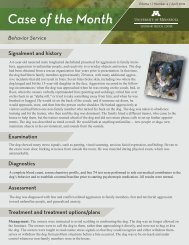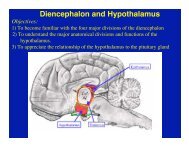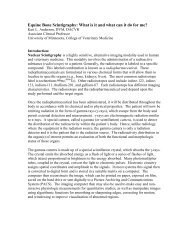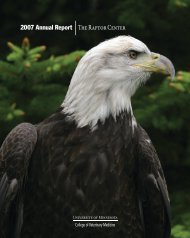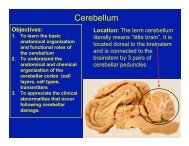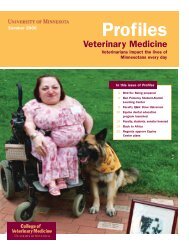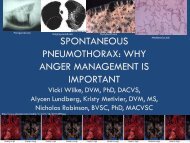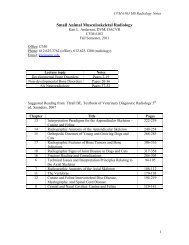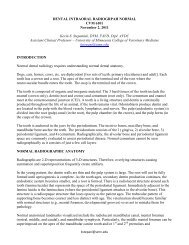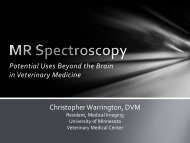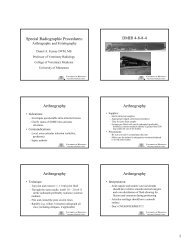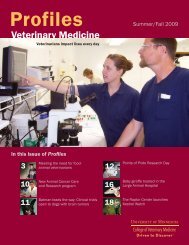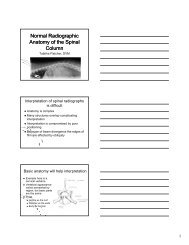Summer/Fall 2013 PDF - University of Minnesota College of ...
Summer/Fall 2013 PDF - University of Minnesota College of ...
Summer/Fall 2013 PDF - University of Minnesota College of ...
You also want an ePaper? Increase the reach of your titles
YUMPU automatically turns print PDFs into web optimized ePapers that Google loves.
RESEARCH TRAINING GRANTS<br />
<strong>of</strong> eventually setting up their own research<br />
labs in an academic setting. McCoy will<br />
finish this summer, while Furrow will<br />
complete her training in summer 2014.<br />
The college’s genetics programs are<br />
recognized as being some <strong>of</strong> the best in<br />
the world and as such attract top postdoc<br />
candidates. Both Furrow and McCoy<br />
are trying to unlock the genetic codes <strong>of</strong><br />
disease conditions that affect both people<br />
and animals by using naturally occurring<br />
maladies in animals as models <strong>of</strong> human<br />
disease.<br />
McCoy has spent the last three years<br />
trying to uncover the role <strong>of</strong> genetics in<br />
osteochondrosis in horses.<br />
“It’s a common disease that affects a large<br />
number <strong>of</strong> foals,” says McCoy. “Genetics<br />
play a role in the disease, but no one has<br />
yet identified the genetic risk factors in<br />
horses.”<br />
McCoy’s advisor, Dr. Molly McCue,<br />
was one <strong>of</strong> the first two PhD students<br />
supported by the grant. An associate<br />
pr<strong>of</strong>essor in the Veterinary Population<br />
Medicine Department, McCue started her<br />
own research lab soon after obtaining a<br />
CVM faculty position.<br />
“Molly is a superstar researcher who is a<br />
product <strong>of</strong> the program,” says McCoy.<br />
A 2006 graduate <strong>of</strong> Michigan State<br />
<strong>University</strong>, McCoy completed an<br />
internship in large animal medicine and<br />
surgery at the CVM and a large animal<br />
surgery residency at Colorado State<br />
<strong>University</strong>.<br />
Once the genetic risk factors for<br />
osteochrondrosis are identified in the<br />
horse, the data could help medical<br />
researchers identify risk factors in humans.<br />
Furrow is also working on a genetics<br />
project that could have far-reaching<br />
benefits for dogs, humans, and possibly<br />
cats. A 2007 graduate <strong>of</strong> the <strong>University</strong><br />
<strong>of</strong> Pennsylvania, Furrow completed<br />
a one-year internship in small animal<br />
medicine and surgery at the <strong>University</strong><br />
<strong>of</strong> Pennsylvania and a residency in small<br />
animal internal medicine at the CVM.<br />
Currently she is working with Dr. Jody<br />
Lulich, pr<strong>of</strong>essor, and Dr. Ned Patterson,<br />
associate pr<strong>of</strong>essor, to identify genes<br />
that contribute to the development <strong>of</strong><br />
calcium oxalate stones in the urinary tract<br />
<strong>of</strong> dogs. Mayo Clinic researchers are<br />
also collaborators on the project and are<br />
looking at stone formation in humans.<br />
“People and dogs will likely benefit the<br />
most from this research because there is<br />
a substantial genetic component to the<br />
development <strong>of</strong> calcium oxalate stones in<br />
both species,” says Furrow. Certain breeds<br />
<strong>of</strong> dogs and families within breeds are also<br />
known to be at high risk <strong>of</strong> developing<br />
these stones.<br />
“The comparative medicine grant allows<br />
us to recruit for top candidates across<br />
the country, and several trainees who<br />
CVM training grants<br />
have completed the program have been<br />
hired in faculty positions,” says Carlson.<br />
Researchers who receive funding through<br />
the NIH grant are given a relatively<br />
high stipend, compared with traditional<br />
funding, as well as money for tuition<br />
and fees, a travel allowance to attend<br />
conferences, and health insurance.<br />
The CVM’s association with the Academic<br />
Health Center has also provided an<br />
advantage when applying for prestigious<br />
awards like the NIH comparative medicine<br />
grant.<br />
“You have to be top-tier to receive one<br />
<strong>of</strong> these grants,” says Carlson. “It is<br />
competitively reviewed every five years,<br />
so it is important that our trainees move<br />
into research positions, either in academia<br />
or industry.”<br />
The CVM currently has three renewable training grants that employ post- and predoctoral<br />
students in various aspects <strong>of</strong> veterinary research.<br />
Comparative Medicine and Pathology Training Grant. This three-year<br />
postdoctoral training program supported by the National Institutes <strong>of</strong> Health is<br />
designed to provide state-<strong>of</strong>-the-art research training to veterinarians. Graduates<br />
receive the advanced training needed for a career as an independent investigator in<br />
a research university or as a research team leader in industry. The faculty mentors<br />
in the program represent a diverse group <strong>of</strong> disciplines, including pharmacology,<br />
cell biology, infectious disease, neurobiology, physiology, genetics, and molecular<br />
biology. The grant program is directed by Dr. Cathy Carlson, Veterinary Population<br />
Medicine, and co-directed by Dr. David Brown, Veterinary and Biomedical<br />
Sciences.<br />
Fellowships in food animal biosecurity: infectious agents and zoonoses.<br />
Funded by the National Institute <strong>of</strong> Food and Agriculture, these fellowships provide<br />
PhD training in the U.S. Department <strong>of</strong> Agriculture’s Targeted Expertise Shortage<br />
Area <strong>of</strong> sciences for agricultural biosecurity. Fellows receive multidisciplinary and<br />
comprehensive basic sciences training in animal infectious diseases, zoonoses,<br />
or biosecurity in preparation for leadership positions in research and practices<br />
pertaining to infectious agents affecting agricultural animals and humans. This<br />
fellowship is directed by Dr. Mark Rutherford, Veterinary and Biomedical Sciences.<br />
Training in neuroimmune-neurobehavior addiction research. This federally<br />
funded pre-doctoral and post-doctoral training for biomedical scientists focuses on<br />
the interactions <strong>of</strong> drug abuse with the nervous and immune systems and integrates<br />
current understanding <strong>of</strong> these physiological interactions with their behavioral<br />
counterparts. This research program is supervised by Dr. Tom Molitor, chair <strong>of</strong> the<br />
Veterinary Population Medicine Department.<br />
Pr<strong>of</strong>iles <strong>Summer</strong>/<strong>Fall</strong> <strong>2013</strong> 9



